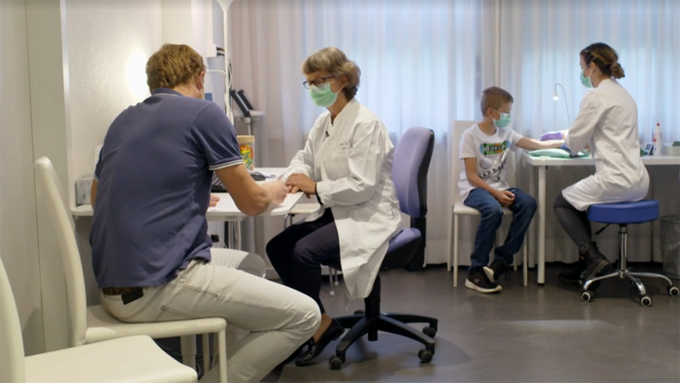A long-term study on the effects of the coronavirus pandemic is being carried out in the cantons of Basel-Stadt and Basel-Landschaft. The study contains both a digital survey that looks at the effects of COVID-19 on individual’s quality of life, as well as conducts antibody testing (a seroprevalence study). Basel-Stadt and Basel-Landschaft are equally contributing to the costs of the long-term study, which is being carried out by Swiss TPH. The study will take place from July to December 2020. This week, randomly selected people will be contacted within the two Basel cantons.

The study aims to find out the effects of COVID-19 on individuals and to obtain information on seroprevalence in the population. (Photo: SRF Einstein, 28 May 2020)
In order to analyse the effects of the coronavirus pandemic (SARS-CoV-2, COVID-19) and to examine the consequences it has on individual's quality of life, the Health Department of Basel-Stadt, the Economic and Health Directorate of Basel-Landschaft and Swiss TPH, which is in charge of the study, are jointly launching the long-term study "COVCO-Basel".
The study aims to investigate the effects of the coronavirus pandemic in the Basel region in two different sample groups (cohorts). The aim is to find out what the direct and indirect effects of COVID-19 are on individuals and their behaviour while at the same time obtain up-to-date information on seroprevalence in the population. Seroprevalence is defined as the frequency of antibodies detected in blood serum at a certain point in time, which indicates an existing or past infectious disease.
Digital survey and antibody test
The long-term study consists of a large digital cohort, which is exclusively questionnaire-based, as well as an seroprevalence cohort (antibody sample group), which additionally includes the antibody testing of whole families. The study within the two Basel cantons is an important part of the national research programme Corona Immunitas from the Swiss School of Public Health (SSPH+).
Implementation to start soon
Between July and December 2020, a total of approximately 10,000 randomly selected individuals will be invited to take part in an online survey. The questions concern coronavirus infections and hygiene measures. In addition, questions will also inquire about quality of life, physical and mental health, lifestyle and work life.
A randomly selected subgroup of 1,200 adult participants from the digital cohort will also be invited to take part in the antibody test. In the first phase, 600 people will be tested for antibody status between July and September 2020. Family members aged seven years and older are eligible to be invited to participate in the study that will examine antibody status and well-being within families. Families that participated in the first phase will be retested for antibodies in the second phase to detect the disappearance or reappearance of antibodies. In the second phase, an additional 600 people will also be tested for antibody status between October and December 2020 to gain insight into the waves of the pandemic.
All participants in the digital long-term study and the seroprevalence study will be asked to answer weekly and monthly short questionnaires via an online platform.
The cantons Basel-Stadt and Basel-Landschaft and Swiss TPH encourage the selected individuals to actively engage and thank them in advance for their participation. The results of the antibody study will be shared in due course.
The two Health Directorates are each contributing 300,000 Swiss francs to the costs of the long-term study. The national Corona Immunitas programme will also contribute at least 330,000 Swiss francs. In total, the study amounts to more than CHF 1 million.
Contact

Nicole Probst-Hensch
Professor, PhD (Pharmacy and Epidemiology), MPH
Head of Department, Group Leader, Head of Unit
+41612848378
nicole.probst@swisstph.ch